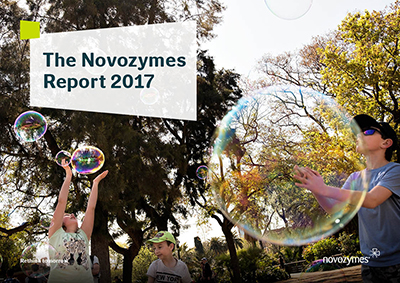Novozymes works closely with partners, including suppliers and customers, to enable the transition to a low-carbon economy. One such partner is ØrstedDong Energy changed its name to Ørsted as of November 6, 2016, after the Danish scientist H.C. Ørsted., Denmark’s largest energy company. Formerly known as DONG Energy – short for Danish Oil and Natural Gas – it has undergone a green transformation and is committed to climate action.
In 2017, Novozymes signed a new 20-year agreement for green district heating and steam with Ørsted, Kalundborg Forsyning and Novo Nordisk, which will enable one of Denmark’s largest coal-fired power stations to phase out coal and replace it with wood chips.
“I'm very pleased that we now have an agreement regarding Asnæs Power Station,” says Thomas Dalsgaard, Executive Vice President of Bioenergy and Thermal Power at Ørsted. "The future belongs to sustainable energy sources such as wind, solar and biomassOrganic material, predominantly plants or plant residues.. We'll therefore be phasing out all use of coal at our power stations by 2023. Our steam and heat customers in Kalundborg have just as ambitious targets to reduce their carbon emissions as we have, and I'm happy that together we can ensure a greener energy supply to the area.”
This will help to further reduce the carbon footprint of Novozymes’ largest production site in Kalundborg, Denmark. We already source 100% of our electricity from wind power in Denmark, and steam accounts for 80% of our carbon emissions from Kalundborg.
Novozymes also supports Ørsted’s low-carbon transition in other ways.
In 2017, Ørsted and Bigadan announced plans to convert residual biomass from Novozymes’ and Novo Nordisk’s factories to biogas, which will be fed directly into the Danish natural gas grid. Ørsted and Bigadan will construct a new biogas plant, which is expected to be operational in 2018. This project is a great example of the circular economy, as it provides additional opportunities for recycling our residual biomass. After being processed at the biogas plant, the biomass will continue to be used as fertilizer on fields, as it has been for many years.
“This is a really good example of how residual products can be even better utilized. The incorporation of biogas in our natural gas network serves as an excellent supplement to the green power from the wind and sun as well as the green district heating from our power stations. Therefore, this project is an important step towards having an energy system that is green, independent and economically viable.” says Thomas Dalsgaard.
Also in 2017, Novozymes started delivering enzymesProteins that act as catalysts, helping to convert one substance into another. for biological sorting of household waste to Ørsted’s Renescience plant in Northwich, UK. "It's important to extract as many resources as possible from waste, and the enzymes are an important part of the process where we convert waste into green energy and recyclable material. This is both good for the environment and useful in terms of reducing the costs of waste management. I'm pleased that together we're also looking at the future prospects for this technology," concludes Thomas Dalsgaard.






